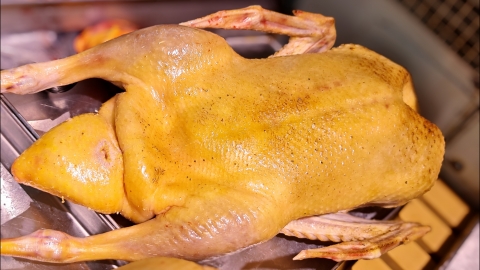What foods should not be consumed with duck meat?
Generally, duck meat is slightly cooling in nature and rich in protein. It is not recommended to consume it together with soft-shelled turtle, chestnuts, rabbit meat, bayberries (Chinese cherries), garlic, or other foods. Detailed explanations are as follows:
1. Soft-shelled Turtle
Soft-shelled turtle is also a cooling food high in protein. Consuming duck meat and soft-shelled turtle together may increase the cooling effect in the body, potentially irritating the gastrointestinal tract and causing discomfort such as abdominal pain and diarrhea, especially for individuals with a cold spleen and stomach condition.

2. Chestnuts
Chestnuts contain a significant amount of starch and dietary fiber, while duck meat is rich in protein and fat, which digests relatively slowly. When consumed together, the combination of starch, fiber, protein, and fat may further slow digestion, easily causing symptoms of indigestion such as bloating and belching.
3. Rabbit Meat
Rabbit meat is cooling in nature, similar to duck meat. Consuming both together may accumulate excessive cooling substances in the body, potentially damaging the spleen and stomach's yang energy, leading to reduced digestive function and symptoms such as loss of appetite and diarrhea. Additionally, both rabbit and duck meat are high in protein, and consuming large amounts together may increase the metabolic burden on the kidneys, which is unhealthy for kidney function. Therefore, they are not suitable to be eaten together.
4. Bayberries (Chinese Cherries)
Bayberries contain a considerable amount of fruit acid, while duck meat is rich in protein. Fruit acid may react with the protein in duck meat to form coagulated masses that are difficult for the human body to digest. This not only reduces the nutritional value of duck meat but may also irritate the gastrointestinal mucosa, causing nausea, vomiting, bloating, and other discomforts, thereby affecting normal gastrointestinal function. Therefore, simultaneous consumption is not recommended.
5. Garlic
Garlic is a pungent and spicy stimulating food, while duck meat is slightly cooling in nature and often consumed through stewing or boiling, emphasizing gentle nourishment. The spicy components in garlic may irritate the gastrointestinal tract, disrupting the gentle digestive environment when consumed with duck meat, potentially causing gastrointestinal discomfort. At the same time, spicy substances may also affect the absorption of nutrients in duck meat, reducing its nutritional value. Therefore, they should not be consumed together.
In addition, duck meat should also be avoided with other cooling foods such as persimmons and mung beans. In daily consumption of duck meat, individuals should adjust intake according to their own physical condition. Patients with hyperthyroidism have a faster metabolism and may moderately consume duck meat to supplement protein but should pay attention to proper food pairing. Patients with hypothyroidism may have a weaker spleen and stomach function and should control the amount of duck meat consumed to avoid increasing the gastrointestinal burden.




